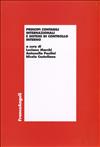
The purpose of this special issue is to contribute to the international debate on novel approaches to corporate data management for the improvement of man-agement control systems. The theme embraces the interdisciplinary relationships that management controls and the accounting function that it, increasingly, should have with other disciplines. These relationships are permeated by both quantitative and qualitative approaches. Quantitative models include those created through data science and those that refer to mathematics, statistics, and information tech-nology. Moreover, corporate data management models combining qualitative and quantitative approaches are explored and discussed within disciplinary areas that, due to their consolidated history, are close to management control: e.g., legal, soci-ological, historical and other humanities areas. This theme embraces not only business data management but also knowledge management; it is not only about internal (accounting and non-accounting) data, but also about external data of a statistical, economic, and social nature, which are of interest from different disci-plinary perspectives concerning the integrated management of accounting data and Big Data. With the development of new technologies, such as the ‘Internet of Things’, and the increasingly extensive applications of blockchain, social net-works, and mobile devices, organizations are generating huge volumes of data in different formats much faster than in the past. In this sense, big data analytics techniques present opportunities to improve decision-making processes of both a strategic and an operational nature, due to their ability to extract knowledge from data, to facilitate problem solving, and to favor predictive and prescriptive ap-proaches to business phenomena. From an organizational point of view, it is im-portant to analyze the impact of Big Data on the professional profiles of actors typically involved in accounting and management control processes.




